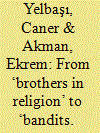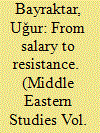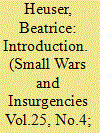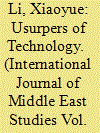|
|
|
Sort Order |
|
|
|
Items / Page
|
|
|
|
|
|
|
| Srl | Item |
| 1 |
ID:
186147


|
|
|
|
|
| Summary/Abstract |
This article analyses the mass migration of Chechens to the Ottoman Empire between the mid-1860s and the 1900s. The Russian expansion to the North Caucasus transformed the entire region surrounding the Black Sea, including its demography, governance and politics. This expansion took place in several phases. The first resulted in a major mass migration by several North Caucasian groups, who abandoned the region in response to the increasing presence of Russian military personnel. During the second stage, the exodus of these groups accelerated because of massacres committed by the Russian military in an attempt to take complete control. Many North Caucasians were exiled to Ottoman lands, arriving en masse, either on foot, or by sailing across the Black Sea.
|
|
|
|
|
|
|
|
|
|
|
|
|
|
|
|
| 2 |
ID:
162521


|
|
|
|
|
| Summary/Abstract |
This article traces the military employment patterns of the highlanders of Dibra in the late eighteenth and early nineteenth centuries. It addresses how the Albanian highlanders found different opportunities for military employment in a period largely associated with political instability. The Albanians as ‘mountain bandits’ have been regarded as the primary culprit of the violence that ravaged the Balkans. The same bandits, this article shows, constituted at the same time the irregular forces the Ottoman army came to rely on in the late eighteenth century. By demonstrating different prospects of employment with which the Albanian irregulars were preoccupied, it provides a broader perspective to observe the turmoil the Balkans underwent in a period of political instability. This article also deals with the intricate interplay between the Albanian irregulars and the Ottoman military administration. It reinserts the Albanian bandits-cum-irregulars into the background of the military reforms. Showing how different prospects for military employment that ranged from freelance plunder to service either for the imperial army or the retinue of the rogue Albanian pashas came to clash with the discourse of military reforms, this article also traces the increasing tension between the Albanian irregulars and the modernising Ottoman army.
|
|
|
|
|
|
|
|
|
|
|
|
|
|
|
|
| 3 |
ID:
133510


|
|
|
|
|
| Publication |
2014.
|
| Summary/Abstract |
When twentieth-century authors wrote about 'partisan warfare', they usually meant an insurgency or asymmetric military operations conducted against a superior force by small bands of ideologically driven irregular fighters. By contrast, originally (i.e. before the French Revolution) 'partisan' in French, English, and German referred only to the leader of a detachment of special forces (party, partie, Parthey, détachement) which the major European powers used to conduct special operations alongside their regular forces. Such special operations were the classic definition of 'small war' (petite guerre) in the late seventeenth and in the eighteenth centuries. The Spanish word 'la guerrilla', meaning nothing other than 'small war', only acquired an association with rebellion with the Spanish War of Independence against Napoleon. Even after this, however, armies throughout the world have continued to employ special forces. In the late nineteenth century, their operations have still been referred to as prosecuting 'la guerrilla' or 'small war', which existed side by side with, and was often mixed with, 'people's war' or popular uprisings against hated regimes.
|
|
|
|
|
|
|
|
|
|
|
|
|
|
|
|
| 4 |
ID:
179847


|
|
|
|
|
| Summary/Abstract |
This article examines banditry, embezzlement, and other insider crimes along Egyptian railway lines during a period when British officials exerted centralized control over the Egyptian railway and financial austerity had a negative impact on the rail sector. By exploring the motives and tactics of railway crimes, I posit that criminals, by making claims on and use of the technology outside the purview of state regulations, expressed their heterogeneous desires to redistribute social wealth, repurpose the technological promise of modern railways, and confound intentions of colonial governance. Using new archival materials, this article utilizes a bottom-up approach to examine grassroots activism, everyday knowledge, informal networks, and the social mores and norms that criminals harnessed to discern infrastructural vulnerabilities and elude surveillance from the colonial state. Ultimately, I contend that criminal acts uncovered social crises otherwise hidden under the shadow of the exterior prosperity and stability of late 19th-century Egypt.
|
|
|
|
|
|
|
|
|
|
|
|
|
|
|
|
| 5 |
ID:
101060


|
|
|
|
|
| Publication |
2010.
|
| Summary/Abstract |
Drawing on the contemporary literature of counterinsurgency as well as primary sources, this article investigates the successful suppression of partisan groups by the Romanian communist authorities during the 1940's and 1950's.
|
|
|
|
|
|
|
|
|
|
|
|
|
|
|
|
|
|
|
|
|